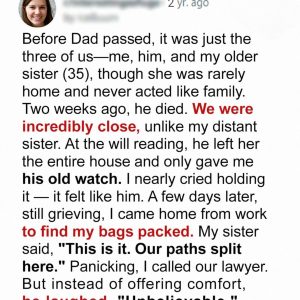Clara was overjoyed when her parents called to say they were visiting for the first time in years. She cleaned the house top to bottom, made up her son Ethan’s room for them, and asked her husband, Tom, to pick them up from the bus station while she worked. But when Clara got home, the house was quiet. Her parents were missing. A phone call revealed the awful surprise: Tom had taken them to a shabby motel on the edge of town. His excuse? “They came to see you, not us.” Clara was stunned. Her parents weren’t just visitors — they were her family. She had planned everything to welcome them into her home. Furious and hurt, she packed a bag and told Tom she was staying with them for the week. “You’ll manage,” she said. “I always do.” At the motel, Clara apologized to her parents and took them to a better inn across town. That night, over takeout and shared stories, she laughed and relaxed in a way she hadn’t in years. When Tom called, overwhelmed with household tasks and parenting, she simply told him, “Figure it out. I did.” Two days later, Tom showed up at the inn with Ethan and a bouquet of flowers. He looked worn and contrite. “I’m sorry. I disrespected your parents and took you for granted,” he said. Clara listened, then accepted the flowers — not as surrender, but as strength. She agreed to come home, but only if her parents were welcome too. Back at the house, things felt different. Tom helped with dinner, her father read to Ethan, and her mother passed on her almond cookie recipe. The wound hadn’t vanished, but something had changed. Clara was no longer invisible. She had finally been heard — and it had taken leaving to be seen.






